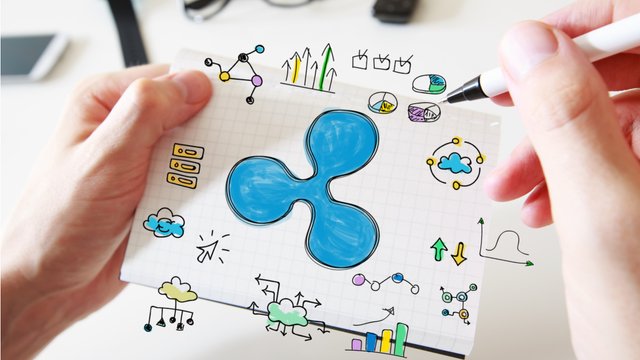The Blockchain Handbook - Chapter 3: Ripple (XRP)
Ripple refers to both the transaction network and cryptocurrency, XRP, released in 2012. Ripple was created as a cryptocurrency for banks and global money transfers. Technically speaking, Ripple is a RTGS, or real-time gross settlement system, that has features of a currency exchange and remittance network. Touted by its creators as the "fastest and most scalable digital asset for real-time payments," Ripple currently has a market cap of $42,613,277,289, and holds a value of $1.09, or 0.00011819 BTC.

True to its mission, Ripple has been adopted by various banks and financial institutions. Unlike currencies such as Bitcoin, which have a growing supply of currency with a capped maximum, or Ethereum, which has no theoretical limits, Ripple was built with all of its supply from the start. There are about 39,009,215,838 XRP in circulation, with a maximum supply of 100,000,000,000 XRP. The demand for Ripple has jutted upwards in 2018, placing at 3rd on the most-valuable cryptocurrency chart, and facilitating a 24-hour volume of about $1,008,030,000.
Ripple: Competition, Pros and Cons
Ripple predates Bitcoin (it was released in 2012; the company was founded in 2004), and was created with slightly different purposes in mind, but still gets compared to the cryptocurrency front-runner on a regular basis. In some ways, there is some overlap between the two platforms. Both forms of digital currency are based on mathematical formulas, both have a limited number of units, and both are capable of peer-to-peer transfers without the need of a go-between.
Ripple isn't Bitcoin, though. For starters, Ripple users don't mine like they would for Bitcoin, and the method of consensus is different, as it "doesn't rely on the energy and computing intensive proof-of-work used by Bitcoin." According to Nasdaq:
"While it is consensus oriented, Ripple is not a blockchain. Ripple uses a HashTree to summarize the data into a single value that is compared across its validating servers to provide consensus."
Another critical difference is Ripple's focus on corporate friendliness. It's far less decentralized, using an enterprise blockchain, what The Daily Dot describes as "a network of nodes that are actually participating banks and financial institutions," as opposed to the public blockchain Bitcoin is famous for implementing.
Because of this, it is popular with large companies, boasting early adopters like Google Ventures, and a growing list of current clients that even includes the Saudi Arabian Monetary Authority. While it can still be used for person-to-person transactions, that's not the primary goal, and big institutions like it because it speeds the transfer of large quantities of assets. Again, from Nasdaq:
"Any type of currency can be exchanged, from fiat currency to gold to even airline miles. They claim to avoid the fees and wait times of traditional banking and even cryptocurrency transactions through exchanges."
This speed and simplicity is what generates most of Ripple's true appeal, as opposed to the value of the cryptocurrency, XRP. Due to the immediate validation made possible by Ripple's nodes (no proof-of-work like Bitcoin), it can complete 1,500 transactions per second compared to Bitcoin's three transactions per second.
Looking at international transactions, they take about 10 minutes (or more) to settle through Bitcoin, whereas Ripple can handle these in roughly 3 seconds. Since XRP is independent from the Ripple's network, institutions don't even need it when they want to transfer other assets like fiat currency, making the Ripple platform a tempting option that transcends the cryptocurrency itself.
The source of Ripple's speed is something of a double-edged sword, however. Blockchain die-hards note that Ripple's centralized system functions more like traditional banks and runs against the ideals that govern cryptocurrencies like Bitcoin (as CEO Brad Garlinghouse would counter, though, Ripple's technology and the XRP Ledger are still open source).
There are also concerns over Ripple's ability to achieve longevity, since no new XRP are being created and the current circulation is under tight control. Then there are the security concerns, borne of the system's openness. As pointed out by Investopedia:
"Researchers at Purdue University have found that, although the core of the network remains highly liquid, that the structure also allows for attacks on certain nodes within the network to cripple some users' access to funds."
Investopedia adds, however, that the ability to detect such weaknesses may actually be a blessing. Traditional banking lacks the same level of transparency, and with vulnerabilities laid bare, Ripple can make genuine efforts to fix them.

The Uses of Ripple
As previously mentioned, Ripple's practical strengths lie outside of its XRP cryptocurrency -- in the technology that allows for fast asset transfers and providing liquidity for banks. Ripple makes it clear through its own use cases that its primary focuses are helping banks "capture new revenue," payment providers "expand their reach," corporates "simplify payments," and exchanges "turn up the volume."
The Future for Ripple
Ripple's success lies in making more inroads with large financial institutions. Ripple believes the current infrastructure for transferring assets internationally is outdated, and wants to move more organizations to its platform. Ripple currently has more than 100 banks that it has licensed its technology to (a small figure when compared to the 11,000 that use the traditional system, SWIFT), but if things go according to plan, that number may well increase in the near future.
Sources:
- https://coinmarketcap.com/currencies/ripple/
- https://bitcoinmagazine.com/guides/what-ripple/
- https://www.digitaltrends.com/computing/what-is-ripple/
- https://ripple.com/
- https://ripple.com/use-cases/
- http://www.nasdaq.com/article/what-is-ripple-cm907864
- http://fortune.com/2017/12/13/ripple-litecoin-bitcoin-price-2018/
- http://fortune.com/2017/10/23/bitcoin-ripple-brad-garlinghouse/
- https://www.express.co.uk/finance/city/900278/ripple-price-what-is-xrp-token-ripple-vs-bitcoin-invest
- https://www.coindesk.com/10-things-you-need-to-know-about-ripple/
- https://www.coindesk.com/ripple-medieval-banking-digital-twist/
- https://ripple.com/insights/ripple-and-saudi-arabian-monetary-authority-offer-pilot-program-for-saudi-banks/
- https://www.finder.com/ripple
- https://www.investopedia.com/news/what-biggest-security-threat-ripple-cryptocurrency/